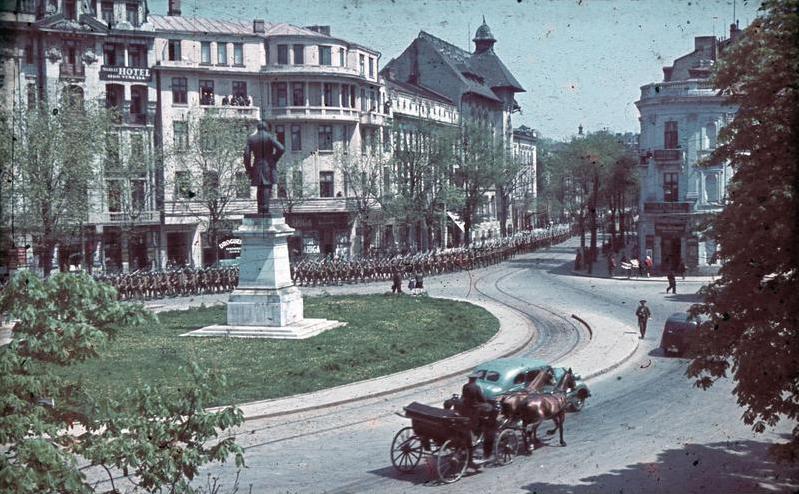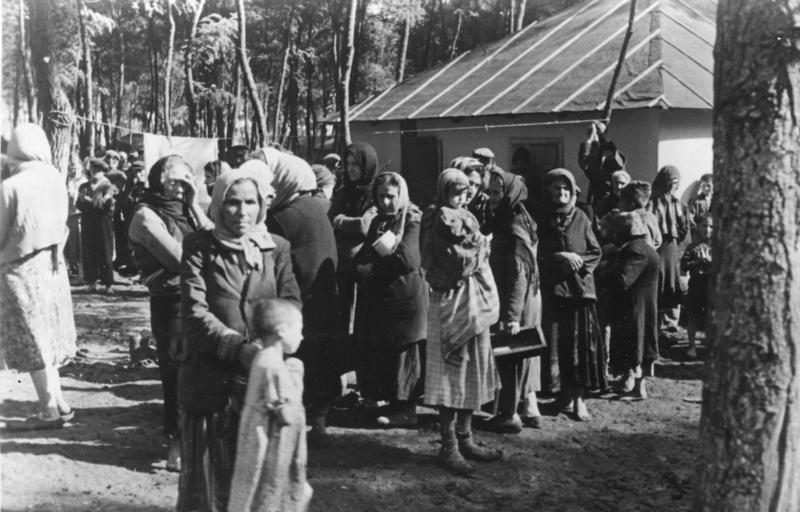.
Romania, column of soldiers on the march in Mihail Kogälniceanu Plaza, Bucharest: photo by Horst Grund, 1941 (Deutsches Bundesarchiv/German Federal Archive)
A few months later, toward the end of the 1941 summer I was returning from Russia weary and ill, after spending long months in the dust and mud of the huge plain between the Dniester and the Dnieper. My uniform was worn, discolored by the sun and rain, soaked in that smell of blood and honey that is the odor of war in the Ukraine. I spent a few days at Bucharest to rest a little after the toil of the long journey through the Ukraine, Bessarabia and Moldavia, but, on the very evening of my arrival, a secretary of the President of the Council rang me up at the Athenée Palace, to warn me that the Vice-President of the Council, Mihai Antonescu, wanted to speak to me.
Mihai Antonescu welcomed me kindly, giving me a cup of tea in his vast light study and began talking about himself in French, with a vainglorious air that reminded me of Count Galeazzo Ciano. He wore a morning coat with a starched collar and a gray silk tie. He had the appearance of a maison de couture. The rosy face of a woman, who resembled him like a sister, seemed to be painted on his round, fat face. I told him that he looked handsome and he thanked me with a smile of profound complacency.
He spoke, staring at me with his small, black, glittering snakelike eyes. No other eyes in the world resemble a snake's so much as Mihai Antonescu's. A bunch of roses were blossoming in a vase on his desk. "I'm very fond of roses," he said. "I prefer them to laurels." I mentioned that his policy threatened to be as short-lived as the roses -- the length of one morning. "The length of a morning!" he answered. "That's eternity!" Later, gazing fixedly at me, he advised me to start immediately for Italy. "You have been indiscreet," he said. "Your war reports from the Russian front have been the subject of much criticism. You are no longer eighteen. It is not consistent with your age to play the enfant terrible. How many years have you already spent in prison in Italy?"
"Five years," I replied.
"Isn't that enough for you? I advise you to be more careful in the future. I have great regard for you; everybody in Bucharest has read your Technique du Coup d'Etat and everybody likes you. Let me tell you that you have no right to maintain that Russia will win this war. Besides, you are wrong. Sooner or later Russia will collapse."
"She will collapse on your back," I replied.
He looked at me with his snakelike eyes, smiling. He offered me a rose and saw me to the door. "Good luck," he said.
Mihai Antonescu (1904-1946), Vice President of the Council of Ministers, Deputy Prime Minister and Minister of Foreign Affairs of the Kingdom of Romania (in office 1 January 1943-23 August 1944): photographer unknown, before 1 June 1946 (the date of his execution, along with Prime Minister Ion Antonescu and other ministers of state, by firing squad)
Romanian Jews in concentration camp, Bessarabia: German military photo by Baas, September 1941 (Deutsches Bundesarchiv/German Federal Archive)
- With the risk of not being understood by some traditionalists which may be among you, I am in favour of the forced migration of the entire Jew element from Bessarabia and Bukovina, which must be thrown over the border. Also, I am in favor of the forced migration of the Ukrainian element, which does not belong here at this time. I don't care if we appear in history as barbarians. The Roman Empire has made a series of barbaric acts from a contemporary point of view and, still, was the greatest political settlement. There has never been a more suitable moment. If necessary, shoot with the machine gun.
- -- Mihai Antonescu, Deputy Prime Minister of the Kingdom of Romania, addressing the Ministers' Council, in Stenograms of the Ministers' Council of the Government of Ion Antonescu, vol. IV, July-September 1941

Chindia Tower, Târgovişte, Romania, built by Vlad III Dracula ("Vlad the Impaler"), Prince of Wallachia, in the 15th century: photo by Christian Chirita, 2006
Curzio Malaparte: Kaputt (excerpt), 1944 (translated from the Italian by Cesare Foligno)






4 comments:
The fate of Mihai Antonescu, Ion Antonescu and the Council of Ministers
Tom,
"She will collapse on your back," I replied.
"Good luck," he said. . . .
10.7
light coming into clouds above shadowed
ridge, golden-crowned sparrow’s oh dear
in foreground, wave sounding in channel
relation of events, observe
that in terms of form
at place which, relative to
which, place at which
silver of low sun reflected in channel,
shadowed green pine on tip of sandspit
Steve,
Well, it probably wouldn't have helped the Council of Ministers much, at that late stage, but still... a bit of good luck, we could all use that,
in terms of form
at place which, relative to
which,
und so weiter.
(After a long day fraught with chaotic material deconstruction and further medical terror here, fully in agreement tonight with your golden-crowned sparrow,
oh dear
in foreground...)
I want to read Kaputt but I wish it were illustrated as it is here. I felt that way about the earlier Malaparte postings also.
Post a Comment